THE AR al ENIANS.* WE have always spoken favourably of
Mr. MACFARLANE 's work on Constantinople. It was at least one of the most opportune works we remember ; and the force of opportunity is great. We had, however, little idea that the praises we had bestowed upon a book of travels could induce him to suppose that he was thereby qualified to produce a work of fiction. We are grieved to say that he has sadly mistaken his vocation. The Armenians prove several things : the principal is, that the author is utterly unqualified to reconceive or create any character or shade of character in the countries he has traversed, or to sustain any dialogue between imaginary characters, or even to describe an incident with life and force.
Sir WALTER SCOTT speaks of Lord Bveoer, on his publication of the first canto of Childe Harold, as "a man whose ideas had been fired by having seen, in distant scenes of difficulty and danger, the places whose very names are recorded in our bosoms astlie scenes of ancient poetry." There are both great and little fires the remark is also applicable to Mr. MACFARLANE, in small : had he never visited the East, we are not sure that he could have ever ventured to adorn even the shelves of Mr. NEWMAN.S library, much less those of the fashionable emporium of fiction in Conduit Street. In these volumes, whatever is good, is in the author's capacity of a traveller, and not as a novelist. Had there been any interest in his story, it would have been completely overlaid by the description of scenery and objects of a local nature : but there is no interest to spoil; we therefore must look -wholly to the descriptive part of the work for all that pretends to value. The action turns, as in other novels, upon the interrupted course of true love, which a difference of sect in the parties will not permit to run smooth. Constantine, a Greek Fanariote prince, falls in love with an Armenian girl, the daughter of a seraff or banker to the Seraglio ; and she returns his passion with interest. They who have read any books of travels in the East, know that the Armenians are a very peculiar sect of Christians ; a timid and self-seeking race, enterprizing in commerce, who perform the part of bankers and merchants to the lazy and military Turks. The Greek schism and the Armenian are incompatible ; and, as in other religious differences the nearer the resemblance of faith, the wider the separation oefeeling; for both Greek and Armenian prefer the heathen Turk to the faith of each other. When, consequently, the Armenian family of the Tinghur-Oglus find out that their daughter has attracted the attention of the prince, they immediately endeavour to abstract her from his attentions ; the Greek pursues, and sets on foot such intrigues as are characteristic of the manners of Constantinople. He often approaches success, but never succeeds ; and the novel ends without a marriage. The scene lies entirely in Constantinople and the neighbourhood, and is certainly not ill described. Many passages of description would have graced either a book of travels or a book of poetry ; for it must be remarked, that the predominant tone of Mr. IVIACFARLANE'S mind is poetical; his prose not unfrequently runs into blank verse—a fault which offends a fastidious taste. The author himself alludes to elnastasius, and dedicates his work to the author ; and he probably imagines that there is some resemblance either in the matter or manner. He could not be more mistaken. His work cannot take rank with either of the more celebrated modern Eastern romances, Anastatius or Hajji Baba. There is genius also in the Kuzzilbash ; Mr. FRASER has proved himself as capable, as a painter of manners and character through the medium of fiction, as he did as a traveller. We are sorry that we cannot pay the same compliment to Mr. MACFARLANE. It seems quite the established order of authorship with respect to the East, that the writer should first favour the world with an account of what he has seen, and then dress up his experience in the shape of a novel. Thus have done MORIER, FRASER, MACFARLANE, and lastly, as we perceive from a publication which has been laid upon the table, and which we shall soon attend to, Mr. MADDEN.
*A Tale of Constantinople. By Charles Macfarlane, Esq. author of "Constanti
nople in 1828." 3 yob. London, 1830.


























 Previous page
Previous page